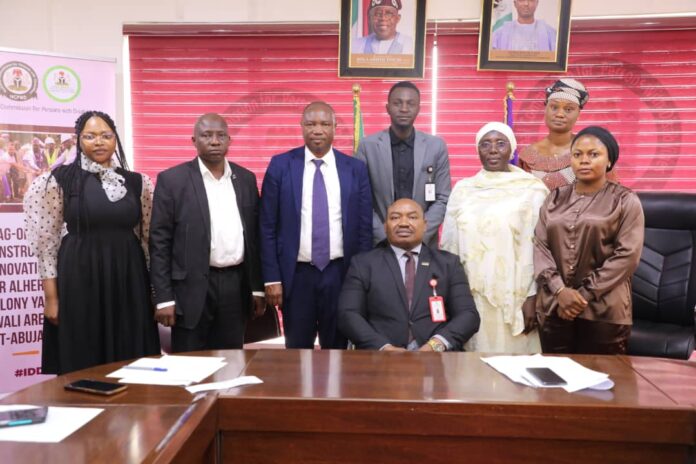Inauguration Marks Significant Step Toward Transparency and Accountability
Abuja, Nigeria – In a bold move to fortify transparency and accountability within the National Commission for Persons with Disabilities (NCPWD), Dr. James David Lalu, the Executive Secretary, has established an Anti-Corruption and Transparency (ACTU) Unit. This significant development was marked by an inauguration ceremony held recently in Abuja, in collaboration with the Independent Corruption Practices and Other Related Offences Commission (ICPC).
The inauguration ceremony was graced by esteemed dignitaries, including the Chairman of ICPC, Dr. Musa Adamu Aliyu, SAN, who was represented by Mr. Clement Obayi, Deputy Director of System Studies and Review. The event also saw the presence of key NCPWD officials, signaling a unified commitment to the federal government’s anti-corruption drive.
In his keynote address, delivered by Hajia Zainab Lawal, Director of the Finance and Accounts Department, Dr. Lalu emphasized the Commission’s alignment with President Ahmed Bola Tinubu’s Renewed Hope Agenda. He underscored the necessity for the Commission to adhere to federal directives and support the anti-corruption movement vigorously.
“I understand that the constitution of ACTU here in NCPWD will support and strengthen the work of the staff of the Commission and enhance the Anti-Corruption movement of the government,” he remarked. Dr. Lalu’s message resonated with the essence of ethical conduct, urging the new ACTU members to embody the highest standards of integrity and responsibility.
The ACTU is expected to play a pivotal role in ensuring that the NCPWD operates with transparency and accountability. Dr. Lalu encouraged the team to adhere strictly to their duties, avoiding all forms of corrupt practices. “Your deportment from this day onwards should be a credit to the State. You must endeavor to shun all vices and corruptible behaviors and let your language be exemplary,” he said, setting a high bar for ethical conduct.
The collaboration with the ICPC underscores a broader institutional commitment to eradicating corruption. In his goodwill message, ICPC Chairman Dr. Musa Adamu Aliyu, represented by Mr. Clement Obayi, lauded the NCPWD for its proactive stance. He outlined the multifaceted responsibilities of the new ACTU, which include conducting system studies and reviews, sensitizing staff against corruption, developing and implementing a Code of Ethics, monitoring budget implementation, and handling preliminary investigations into complaints.
“The new Unit will assist the management of the Commission in promoting a transparent workforce by effectively discharging its duties,” Mr. Obayi stated. His words highlighted the critical role that the ACTU will play in fostering a culture of integrity within the NCPWD.
The newly inducted ACTU Chairman, Barrister Ikem Uchegbulam, expressed deep gratitude for the trust placed in him and his team. In his acceptance speech, he pledged their unwavering commitment to their new roles, vowing to uphold the principles of integrity and decorum. “We will pursue our roles with candor and decorum, and uphold our duties with integrity,” Barrister Uchegbulam declared, signaling a new era of ethical governance within the Commission.
The event was also attended by other notable figures, including Barrister Joseph Okon, Director of Legal Services; Mr. Carl Guruyen from the Human Resource Department; and Mr. Moses Gyan, Head of the Monitoring and Evaluation Unit. Their presence underscored the comprehensive support for the ACTU and the shared vision of a corruption-free NCPWD.
The establishment of the ACTU is a testament to the NCPWD’s dedication to creating an accountable and transparent institution. It reflects a broader national effort to instill ethical practices across all governmental bodies, ensuring that public servants adhere to the highest standards of integrity.
As the NCPWD moves forward, the ACTU’s role will be crucial in maintaining transparency and accountability, reinforcing the Commission’s commitment to serving the interests of persons with disabilities with the utmost integrity. This initiative not only aligns with the federal government’s anti-corruption agenda but also sets a precedent for other agencies to follow, highlighting the importance of ethical governance in achieving sustainable development goals.


